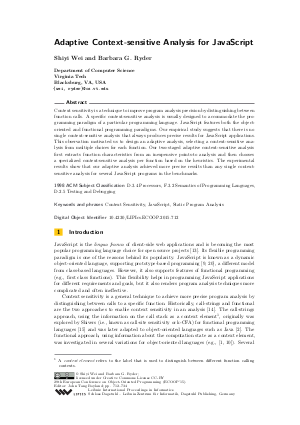Adaptive Context-sensitive Analysis for JavaScript
Authors Shiyi Wei, Barbara G. Ryder
-
Part of:
Volume:
29th European Conference on Object-Oriented Programming (ECOOP 2015)
Part of: Series: Leibniz International Proceedings in Informatics (LIPIcs)
Part of: Conference: European Conference on Object-Oriented Programming (ECOOP) - License:
 Creative Commons Attribution 3.0 Unported license
Creative Commons Attribution 3.0 Unported license
- Publication Date: 2015-06-29
File

PDF
LIPIcs.ECOOP.2015.712.pdf
- Filesize: 0.76 MB
- 23 pages
Document Identifiers
Subject Classification
Keywords
- Context Sensitivity
- JavaScript
- Static Program Analysis
Metrics
- Access Statistics
-
Total Accesses (updated on a weekly basis)
0PDF Downloads0Metadata Views
Abstract
Context sensitivity is a technique to improve program analysis precision by distinguishing between function calls. A specific context-sensitive analysis is usually designed to accommodate the programming paradigm of a particular programming language. JavaScript features both the object-oriented and functional programming paradigms. Our empirical study suggests that there is no single context-sensitive analysis that always produces precise results for JavaScript applications. This observation motivated us to design an adaptive analysis, selecting a context-sensitive analysis from multiple choices for each function. Our two-staged adaptive context-sensitive analysis first extracts function characteristics from an inexpensive points-to analysis and then chooses a specialized context-sensitive analysis per function based on the heuristics. The experimental results show that our adaptive analysis achieved more precise results than any single context-sensitive analysis for several JavaScript programs in the benchmarks.
Cite As Get BibTex
Shiyi Wei and Barbara G. Ryder. Adaptive Context-sensitive Analysis for JavaScript. In 29th European Conference on Object-Oriented Programming (ECOOP 2015). Leibniz International Proceedings in Informatics (LIPIcs), Volume 37, pp. 712-734, Schloss Dagstuhl – Leibniz-Zentrum für Informatik (2015)
https://doi.org/10.4230/LIPIcs.ECOOP.2015.712
BibTex
@InProceedings{wei_et_al:LIPIcs.ECOOP.2015.712,
author = {Wei, Shiyi and Ryder, Barbara G.},
title = {{Adaptive Context-sensitive Analysis for JavaScript}},
booktitle = {29th European Conference on Object-Oriented Programming (ECOOP 2015)},
pages = {712--734},
series = {Leibniz International Proceedings in Informatics (LIPIcs)},
ISBN = {978-3-939897-86-6},
ISSN = {1868-8969},
year = {2015},
volume = {37},
editor = {Boyland, John Tang},
publisher = {Schloss Dagstuhl -- Leibniz-Zentrum f{\"u}r Informatik},
address = {Dagstuhl, Germany},
URL = {https://drops.dagstuhl.de/entities/document/10.4230/LIPIcs.ECOOP.2015.712},
URN = {urn:nbn:de:0030-drops-52446},
doi = {10.4230/LIPIcs.ECOOP.2015.712},
annote = {Keywords: Context Sensitivity, JavaScript, Static Program Analysis}
}
Author Details
References
-
Ole Agesen. The cartesian product algorithm: Simple and precise type inference of parametric polymorphism. In Proceedings of the 9th European Conference on Object-Oriented Programming, ECOOP'95, pages 2-26, 1995.

-
David Grove, Greg DeFouw, Jeffrey Dean, and Craig Chambers. Call graph construction in object-oriented languages. In Proceedings of the 12th ACM SIGPLAN Conference on Object-oriented Programming, Systems, Languages, and Applications, OOPSLA'97, pages 108-124, 1997.

-
Samuel Z. Guyer and Calvin Lin. Client-driven pointer analysis. In Proceedings of the 10th International Conference on Static Analysis, SAS'03, pages 214-236, 2003.

-
Simon Holm Jensen, Anders Møller, and Peter Thiemann. Type analysis for JavaScript. In Proceedings of the 16th International Symposium on Static Analysis, SAS'09, pages 238-255, 2009.

-
Vineeth Kashyap, Kyle Dewey, Ethan A. Kuefner, John Wagner, Kevin Gibbons, John Sarracino, Ben Wiedermann, and Ben Hardekopf. Jsai: A static analysis platform for JavaScript. In Proceedings of the 22Nd ACM SIGSOFT International Symposium on Foundations of Software Engineering, FSE 2014, pages 121-132, 2014.

-
George Kastrinis and Yannis Smaragdakis. Hybrid context-sensitivity for points-to analysis. In Proceedings of the 34th ACM SIGPLAN Conference on Programming Language Design and Implementation, PLDI'13, pages 423-434, 2013.

-
Ondřej Lhoták and Laurie Hendren. Evaluating the benefits of context-sensitive points-to analysis using a bdd-based implementation. ACM Trans. Softw. Eng. Methodol., 18(1):3:1-3:53, October 2008.

-
Percy Liang and Mayur Naik. Scaling abstraction refinement via pruning. In Proceedings of the 32Nd ACM SIGPLAN Conference on Programming Language Design and Implementation, PLDI'11, pages 590-601, 2011.

-
Henry Lieberman. Using prototypical objects to implement shared behavior in object-oriented systems. In Conference proceedings on Object-oriented programming systems, languages and applications, OOPLSA'86, pages 214-223, 1986.

-
Ana Milanova, Atanas Rountev, and Barbara G. Ryder. Parameterized object sensitivity for points-to analysis for Java. ACM Trans. Softw. Eng. Methodol., 14(1):1-41, January 2005.

-
Hakjoo Oh, Wonchan Lee, Kihong Heo, Hongseok Yang, and Kwangkeun Yi. Selective context-sensitivity guided by impact pre-analysis. In Proceedings of the 35th ACM SIGPLAN Conference on Programming Language Design and Implementation, PLDI'14, pages 475-484, 2014.

-
J. Ross Quinlan. C4.5: Programs for Machine Learning. Morgan Kaufmann Publishers Inc., San Francisco, CA, USA, 1993.

- RedMonk. The RedMonk programming language rankings. http://redmonk.com/sogrady/2014/06/13/language-rankings-6-14/, 2014.
-
Micha Sharir and Amir Pnueli. Two approaches to interprocedural data flow analysis. Program Flow Analysis: Theory and Applications, pages 189-234, 1981.

-
Olin Grigsby Shivers. Control-flow Analysis of Higher-order Languages of Taming Lambda. PhD thesis, Carnegie Mellon University, 1991.

-
Yannis Smaragdakis, Martin Bravenboer, and Ondrej Lhoták. Pick your contexts well: understanding object-sensitivity. In Proceedings of the 38th annual ACM SIGPLAN-SIGACT symposium on Principles of programming languages, POPL'11, pages 17-30, 2011.

-
Yannis Smaragdakis, George Kastrinis, and George Balatsouras. Introspective analysis: Context-sensitivity, across the board. In Proceedings of the 35th ACM SIGPLAN Conference on Programming Language Design and Implementation, PLDI'14, pages 485-495, 2014.

-
Manu Sridharan and Rastislav Bodík. Refinement-based context-sensitive points-to analysis for Java. In Proceedings of the 2006 ACM SIGPLAN Conference on Programming Language Design and Implementation, PLDI'06, pages 387-400, 2006.

-
Manu Sridharan, Julian Dolby, Satish Chandra, Max Schäfer, and Frank Tip. Correlation tracking for points-to analysis of JavaScript. In Proceedings of the 26th European Conference on Object-Oriented Programming, ECOOP'12, pages 435-458, 2012.

-
Peter Wegner. Dimensions of object-based language design. In Conference proceedings on Object-oriented programming systems, languages and applications, OOPSLA'87, pages 168-182, 1987.

-
Shiyi Wei and Barbara G. Ryder. Practical blended taint analysis for JavaScript. In Proceedings of the 2013 International Symposium on Software Testing and Analysis, ISSTA 2013, pages 336-346, 2013.

-
Shiyi Wei and Barbara G. Ryder. State-sensitive points-to analysis for the dynamic behavior of JavaScript objects. In Proceedings of the 28th European Conference on Object-oriented Programming, ECOOP'14, pages 1-26, 2014.

